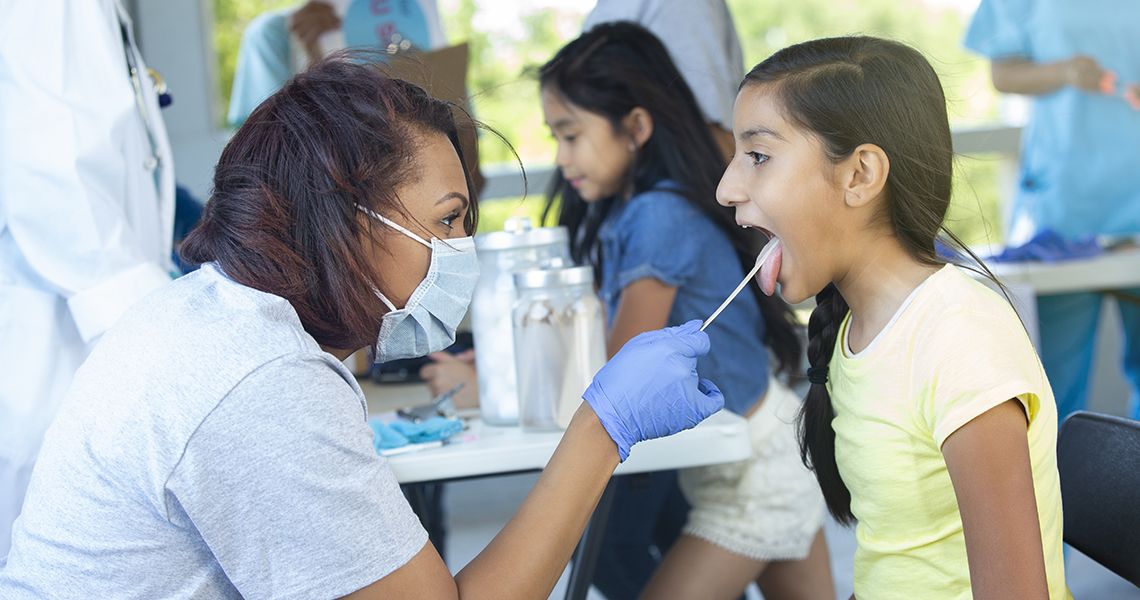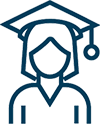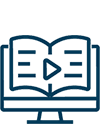
Community Health encompasses a rich set of programs, interventions, research, and policies aimed at improving the health of members of a community. Rather than focusing exclusively on the individual, Community Health practitioners, researchers, and advocates expand their work to the broader context in which health occurs – the community. But “community” is a multidimensional term that can describe a wide range of ways in which we as populations congregate and coalesce: geographic location (e.g., neighborhood, city, state); venues for activities (e.g., work, education, faith-based organizations); and, shared characteristics (e.g., race/ethnicity, age, sex, orientation, religion).
Given the breadth of the term “community” and because most people define themselves as members of multiple communities, Community Health is an exciting, evolving, and expansive topic. The Community and Urban Health (CUH) track activities reflect this breadth. In the CUH track, students are exposed to a broad array of Community Health issues, programs, research, policies, and models of service delivery, with a particular focus on the urban setting. Examples of CUH issues include: food security, health equity and social determinants of health, culture and health, housing, community violence, disaster responsiveness, community-based participatory research, advocacy, and many others.
Program Objectives
- Interpret the role of social and cultural determinants of health on community health
- Discuss different modalities for assessing community health needs and designing appropriate interventions
- Describe components of culturally competent clinical care, including care for patients from underserved communities in low-resource outpatient settings
- Identify categories of community resources that exist for commonplace community health problems as well as best practices for accessing the resources
- Assess organizational functionality within community health sectors
- Recognize the role of clinicians in community health and community-based action to promote health
Meet Your Community/Urban Health Directors
Overview of Requirements
The CUH learning opportunities include a wide array of activities. In Years 1 and 2, students attend a wide array of lectures, case studies, seminars, and other educational opportunities that draw on the expertise of GWU faculty and clinicians as well as community partners, practitioners, and health policy leaders from across Washington, D.C. Students are also introduced to applied Community Health in Years 1 and 2 as they participate in a community-based opportunity, such as the student-run HEALing Clinic or relevant community organizations (e.g., Whitman-Walker Health, Mary’s Center, Miriam’s Kitchen). This applied component of the CUH track is reinforced with the “Summer Experience” between Year 1 and Year 2, in which students select, arrange, and complete an enriching community health opportunity (clinical or non-clinical) that is additive to their studies and builds upon their interests. In Years 3 and 4, students complete a community health-focused “Scholarly Project,” an M.D. Program requirement that entails an in-depth exploration of a health or medical issue of interest. In Year 4, students may select 1 of 4 unique community health electives to build leadership skills and expertise in particular fields. Throughout the four-year CUH track, Track Directors and Faculty Advisers are available to provide input, direction, and mentorship through drop-in group sessions and the option of one-on-one meetings.
Program Activities and Schedule
Year 1
| Fall |
|
| Winter Break |
|
| Spring |
|
Summer, Year 1-2
| Summer |
|
Year 2
| Fall |
|
Year 3
| All Year |
|
Year 4
| All Year |
|
| Spring |
|
Description of Program Activities
Lecture/Case Studies/Seminars: Between December of Year 1 and December of Year 2, students will attend 8 CUH lectures/case studies/seminars on a range of community health-related topics. These sessions will be scheduled either as midday lunch sessions or as evening sessions to best accommodate guest schedules. Some of these sessions may include preparatory readings or other pre-session activities, and every attempt will be made to make the sessions interactive and engaging. Make-up opportunities are available, including attending authorized events sponsored by other Tracks, watching videos of previous CUH events, or similar; some make-up experiences may include a brief reflection assignment.
Community-Based Opportunity: Between December of Year 1 and December of Year 2, students will participate in at least 4 hours of community service monthly (or an equivalent time commitment as authorized by Track Directors) in a community-based organization(s) (clinical or non-clinical), such as the student-run HEALing Clinic or relevant community organizations (e.g., Whitman-Walker Health, Mary’s Center, Miriam’s Kitchen). Students will be given the opportunity to build relationships with community-based organizations and key personnel through these community service-learning (CSL) opportunities. Students will be able to draw on these experiences during track session discussions.
Summer Experience: Between May of Year 1 and July before Year 2, students will complete an enriching experience (clinical or non-clinical) that is additive to their studies, builds upon their interests, and is related to community health (don’t worry – nearly everything is). This experience can encompass a wide range of opportunities – from direct clinical services in a community setting to volunteering in an organization working to improve health at the community level to research on a topic with community health relevance to any number of other experiences. The experience should represent a substantial time commitment for much of the summer, but the goal is to ensure an enriching experience rather than to focus on the time or schedule. Track Directors and Faculty Advisers are available to discuss specific proposals or questions during the regularly held drop-in sessions, and can meet individually after that if needed. Students seeking scholarship support will submit their summer proposal in February – March of Year 1, while the remaining students will submit proposals in early May. Students complete a written reflection paper in August of Year 2.
Scholarly Project: All GW SMHS medical students begin a scholarly project in Year 3 and complete it in Year 4. These projects allow students to conduct an in-depth exploration of issues of interest in medicine and health. For CUH students, the scholarly project provides an opportunity to explore community/urban health issues of particular interest to them. Students begin considering project topics early in Year 3; the topic may be an extension of their summer experience, may be an issue raised during a Clerkship, or may be an issue of personal or professional interest. Students are able to discuss the scholarly project during June and September CUH meetings in Year 3 (during Intersessions), and may attend drop-in sessions throughout the academic year. Final deliverables are typically either a 10-15 page written paper or a poster with an oral presentation and a 1-page abstract; final deliverables are due in early March of Year 4.
4th Year Electives:
All CUH students must complete a 4-6 week elective related to community/urban health. There are currently six (6) CUH electives offered as outlined below.
Community Health Elective – HEALing Clinic Leadership (IDIS 354): Students will enroll in IDIS 354 “Community Health Elective” during Year 4 and will participate in 12 HEALing Clinic sessions, assuming a leadership role during those clinic sessions. This is a 4-week elective, but students spread this course over the entire year to complete responsibilities. Deliverables: Submit 1 Case Study from your sessions (Structural & Cultural Competency Case Report).
Community Health Elective-Experiential Learning in Community Health (IDIS 367): Students are able to create project-specific community health leadership experiences through problem identification, multiple site visits & key informant interviews and policy proposals (8-10p final product). This is a 4-week elective, but students spread this course over the entire year to complete responsibilities. Deliverables: Submit your IDIS 367 Attestation Form found in the appendix.
Culinary Medicine (IDIS 307): Students are able to complete a 2-week elective, and students DO NOT have the option of spreading this course over the entire year to complete responsibilities. There are two 2-week blocks offered, comprised of eight virtual/in-kitchen sessions for ~16 students throughout the year. The goal of this elective is to provide students with evidence-based, practical knowledge in order to better understand nutrition and how it relates to the health of patients and their communities through hands-on cooking classes and educational modules.
Advanced Culinary Medicine (IDIS 407): Students are able to complete a 4-week elective, and students DO NOT have the option of spreading this course over the entire year to complete responsibilities. IDIS 307 is NOT a pre-requisite. This 4-week block is focused on integrating students into the academic culinary medicine team. The goal of this elective is to develop skills to lead classes, both for healthcare professionals and community members, through hands-on experience in the teaching kitchen and developing a deeper understanding of nutrition science and current research. This empowers students how to communicate evidence-based nutrition information to both public and professional groups.
Exploring Implicit Bias in Medicine (IDIS 401): Students are able to complete a 2-week elective, with the option of spreading this course over the entire year to complete responsibilities. This 2-week elective course will expose students to implicit bias and bystander intervention literature, introduce examples of how implicit bias may affect the clinical setting, and allow students to apply knowledge through the development of an implicit bias intervention presentation.
Clinical Pediatrics Acting Internship - General Pediatrics - Purple Team (PED 364): Students are able to complete a 4-week elective, and students DO NOT have the option of spreading this course over the entire year to complete responsibilities. Full-time Acting Internship in Pediatrics as part of the resident & hospitalist team. The overnight call experience will be provided during the 2nd or 3rd week of the rotation on the resident night float team. There is a weekend requirement. This elective provides a close working relationship with pediatric residents during their required inpatient ward month.
Pediatric HIV Infection (PED 368): Students are able to complete a 2-week or 4-week elective, and students DO NOT have the option of spreading this course over the entire year to complete responsibilities. In this elective, rotators will learn about prevention of perinatal HIV transmission of HIV, prevention of horizontal transmission of HIV and management of HIV for children and youth living with HIV. This will include the management of both perinatal-acquired and behavioral-acquired HIV. The rotator will learn about the clinical course and treatment of pediatric HIV infection, principles of antiretroviral therapy, HIV resistance, opportunistic infections, care of the pediatric HIV patients, HIV prevention and psychosocial aspects of HIV care and treatment. Additional aspects of this rotation include global perspectives on pediatric and adolescent HIV, clinical research participation (optional) and independent study. The student will participate in all Special Immunology clinical activities and multidisciplinary meetings.
Child Abuse Pediatrics (PED 372): Students are able to complete a 4-week elective, and students DO NOT have the option of spreading this course over the entire year to complete responsibilities. Trainees focus on the identification, diagnosis and management of child abuse and neglect in the in-patient setting, a hospital-based clinic, and at DC’s Child Advocacy Center (Safe Shores). This elective offers a comprehensive overview of appropriate history taking and physical examination techniques. The elective includes opportunities to learn about normal and abnormal genital exams when there is concern for sexual abuse. Trainees are exposed to skin manifestations of abuse, fractures, and abusive head trauma. There are opportunities to observe forensic interviewers, social workers, law enforcement and legal colleagues, and to work directly with Child Abuse Pediatricians.
Pediatric Health Generations - Teen Parent Program (PED 407): Students are able to complete a 2-week or 4-week elective, and students DO NOT have the option of spreading this course over the entire year to complete responsibilities. Healthy Generations at Children’s National is a “Teen-Tot” clinic offering medical care and comprehensive social work and mental health services for teen parents and their children. Students will have the opportunity to assist in evaluating patients in the multidisciplinary Generations medical clinic, providing preventative well child care, anticipatory guidance, as well as providing medical care for adolescent parents, including routine gynecological care, STD testing and counseling, and contraceptive care. Students will have the opportunity to work with members of the multidisciplinary case-management team to learn about community resources available to support adolescent parents as well as accompany team-members on community-based visits. At times when patients are not scheduled, the student will be asked to participate in the general outpatient clinic and/or engage in independent study. No weekends or calls. Although residents do not typically participate in this elective, students will have an opportunity to interact with them during resident conferences.
Case-based Elective in Criminal Justice Health (MED 353): Students are able to complete an intense 2-week rotation at the intersection of healthcare and criminal justice. Students work closely with Dr. Newton Kendig daily, in-person as they complete case studies, write-ups, and discussions on a variety of topics. This course is a 2-week elective, and students DO NOT have the option of spreading this course over the entire year to complete responsibilities. Please see MED 353 in the Course Catalog HERE for details on the weeks offered, as well as how to enroll. Deliverables: Submit 1 case study from your sessions.
Introduction to Correctional Medicine (MED 346): Students are able to complete a 4-week elective including both case-based learning and a clinical rotation at the DC jail. Students DO NOT have the option of spreading this course over the entire year to complete responsibilities. Students are required to have a background investigation, urine drug screening, and a one-week jail orientation. The course, which is limited to two students for each of the two offered blocks, is offered periodically in accordance with student interests and in coordination with the DC jail. Priority will be given to students with prior advocacy work for patients involved in the criminal legal system. Enrollment requires a letter of interest and approval by the course director. See MED 346 in the course catalog HERE for more information, as well as what weeks the course will be offered.
CUH Track “Philosophy and Culture:”
The Scholarly Concentration Director and Faculty Advisers hope to foster a sense of community, shared mission and support among all who choose this Track – all students Years 1-4 and faculty. As such, we attempt to be very available for ad hoc meetings and discussions, and we sponsor regular unstructured ‘drop-in’ sessions for people to gather, discuss projects, share experiences, and to make our own CUH community strong and mutually supportive.
*Other educational opportunities and activities to enrich students’ experiences may be added to the curriculum during the program, at the discretion of the Scholarly Concentration Director.



